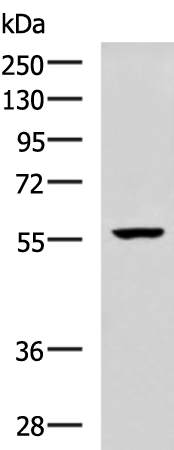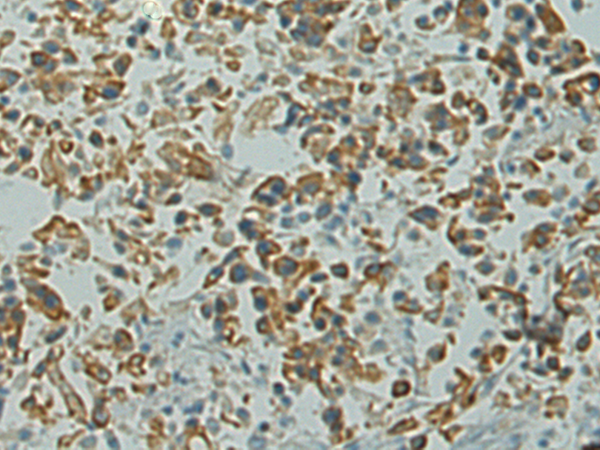

| WB | 咨询技术 | Human,Mouse,Rat |
| IF | 咨询技术 | Human,Mouse,Rat |
| IHC | 1/50-1/100 | Human,Mouse,Rat |
| ICC | 技术咨询 | Human,Mouse,Rat |
| FCM | 咨询技术 | Human,Mouse,Rat |
| Elisa | 1/5000-1/10000 | Human,Mouse,Rat |
| Aliases | MACAM1 |
| WB Predicted band size | 40 kDa |
| Host/Isotype | Rabbit IgG |
| Antibody Type | Primary antibody |
| Storage | Store at 4°C short term. Aliquot and store at -20°C long term. Avoid freeze/thaw cycles. |
| Species Reactivity | Human, Mouse |
| Immunogen | Synthetic peptide of human MADCAM1 |
| Formulation | Purified antibody in PBS with 0.05% sodium azide and 50% glycerol. |
+ +
以下是关于MADCAM1抗体的3篇代表性文献,简要总结如下:
1. **文献名称**:*"Cloning and functional characterization of mucosal addressin cell adhesion molecule-1 (MAdCAM-1) reveals its role in lymphocyte-endothelial cell adhesion"*
**作者**:Briskin, M. J., et al.
**摘要**:该研究首次克隆了MAdCAM-1基因,揭示了其在肠道淋巴组织中的特异性表达,并证明其通过与α4β7整合素结合介导淋巴细胞归巢,为后续抗体开发奠定基础。
2. **文献名称**:*"Antibody blockade of MAdCAM-1/α4β7 interactions ameliorates chronic colitis by a mechanism dependent on CD4+ regulatory T cells"*
**作者**:Rivera-Nieves, J., et al.
**摘要**:通过结肠炎小鼠模型,研究发现抗MADCAM1抗体可阻断α4β7整合素与其结合,减轻炎症反应,并证实其疗效依赖于调节性T细胞的激活。
3. **文献名称**:*"Anti-MAdCAM-1 antibody (PF-00547659) for active ulcerative colitis: A randomized phase 2 study"*
**作者**:Feagan, B. G., et al.
**摘要**:一项Ⅱ期临床试验表明,抗MADCAM1单抗(Ontamalimab)可显著改善中重度溃疡性结肠炎患者的症状和内镜评分,验证了其作为靶向治疗的潜力。
(注:若需扩展文献范围,可进一步检索近年关于MADCAM1抗体在免疫疾病或癌症中的研究。)
MAdCAM-1 (Mucosal Vascular Addressin Cell Adhesion Molecule 1) is a cell surface glycoprotein primarily expressed on endothelial cells in mucosal tissues, gut-associated lymphoid organs, and inflamed sites. It belongs to the immunoglobulin superfamily and plays a critical role in lymphocyte trafficking to mucosal regions by binding to integrin α4β7 and L-selectin on leukocytes. This interaction facilitates the selective homing of immune cells, particularly lymphocytes, to intestinal and gut-associated lymphoid tissues, making MAdCAM-1 a key mediator in mucosal immunity and inflammation.
MAdCAM-1 antibodies are therapeutic or experimental tools designed to block this adhesion pathway. In inflammatory bowel diseases (IBD), such as Crohn’s disease and ulcerative colitis, MAdCAM-1 is overexpressed, promoting excessive leukocyte infiltration and tissue damage. Anti-MAdCAM-1 antibodies (e.g., ontamalimab) aim to inhibit integrin binding, thereby reducing inflammation. Preclinical and clinical studies highlight their potential to suppress chronic inflammation while preserving systemic immunity, offering a targeted approach compared to broader immunosuppressants. Research also explores their role in autoimmune disorders and cancer immunotherapy. Despite promise, challenges include optimizing specificity and managing long-term safety profiles. Overall, MAdCAM-1 antibodies represent a biologically rational strategy for modulating gut-specific immune responses.
×